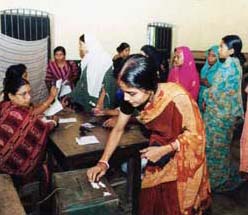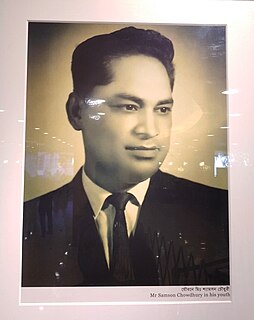
Dhaka, formerly known as Dacca, is the capital and largest city of Bangladesh, as well as the world's largest Bengali-speaking city. It is the eighth largest and sixth most densely populated city in the world with a population of 8.9 million residents as of 2011, and a population of over 21.7 million residents in the Greater Dhaka Area. According to a Demographia survey, Dhaka has the most densely populated built-up urban area in the world, and is popularly described as such in the news media. Dhaka is one of the major cities of South Asia and a major global Muslim-majority city. As part of the Bengal delta, the city is bounded by the Buriganga River, Turag River, Dhaleshwari River and Shitalakshya River.

Bangladesh elects on national level a legislature with one house or chamber. The unicameral Jatiyo Sangshad, meaning national parliament, has 350 members of which 300 members are directly elected through a national election for a five-year term in single-seat constituencies while 50 memberships are reserved for the women who are selected by the ruling party or coalition. The Prime Minister is the head of the government. The president who is the head of the state is elected by the National Parliament. The president of Bangladesh is a ceremonial post and does not exercise any control over the running of the state.

Christians in Bangladesh account for 0.4% of the nation's population as of 2011 census. Together with Judaism and Buddhism, they account for 0.7% of the population. Islam accounts for 90.4% of the country's religion, followed by Hinduism at 8.5% as per 2011 census.

The Church of Bangladesh is a united Protestant church formed by the union of various Protestant churches in Bangladesh, principally the Anglican and Presbyterian denominations. The Church of Bangladesh is a member of the Anglican Communion and World Communion of Reformed Churches.

Bengali Christians are adherents of Christianity among the Bengali people. Christianity took root in Bengal after the arrival of Portuguese voyagers in the 16th century. It witnessed further conversions among the Bengali upper-caste elite during the 19th century Bengali Renaissance.

The Bishwa Ijtema is an annual gathering of Muslims in Tongi, by the banks of the River Turag, in the outskirts of Dhaka, Bangladesh. It is one of the largest peaceful gatherings in the world. The Ijtema is a prayer meeting spread over three days, during which attending devotees perform daily prayers while listening to scholars reciting and explaining verses from the Quran. It culminates in the Akheri Munajat, or the Concluding Supplication, Maulana Zubair Ahmed in which millions of devotees raise their hands in front of Allah (God) and pray for world peace. The Ijtema is considered a demonstration of Muslim unity, solidarity, mutual love and respect and an opportunity to reiterate their commitment to Islamic values.

The World Reformed Fellowship (WRF) is an ecumenical Christian organization which promotes unity between confessional Calvinist churches around the world.

Malwali Masjid/Mosque, Kakrail Markaz is a mosque in the Kakrail neighbourhood of Ramna Dhaka, Bangladesh. Located near Ramna Park, it is the centre of the Tabligh Jamat in Bangladesh.

The Bangladesh Baptist Church Sangha is a Baptist Christian denomination in Bangladesh. It is affiliated with the Baptist World Alliance. The headquarters is in Dhaka.

The Armenians in Bangladesh were ethnic Armenians who lived in what is now called Bangladesh. Their numbers have gradually diminished and there are now no Armenians in the country.

Samson H. Chowdhury was a Bangladeshi business magnate. He was the chairman of Square Pharmaceuticals.

The Armenian Church, also known as Armenian Apostolic Church of the Holy Resurrection, is a historically significant architectural monument situated in the Armanitola area of old Dhaka, Bangladesh. The church bears testimony to the existence of a significant Armenian community in the region in the 17th and 18th centuries.

The Anglican Church of St. John the Evangelist, also known simply as St. John's, is located in İzmir, Turkey, in the quarter of Alsancak. It was built about 1625 by the Levant Company.
The Presbyterian Church of Bangladesh (PCB) is a Reformed Churches conservative and evangelical in Bangladesh. Formed in 1995 by Rev. Edward Ayub, a former Muslim convert to Christianity, with the assistance of Presbyterian Church in America.
Abul Faraḥ Muḥammad ʿAbdul Ḥaque Farīdī was a Bangladeshi educator and author. In recognition of his contributions in the field of linguistics, he was awarded a Bangla Academy Fellowship. Faridi was the founder of Islamic Foundation Bangladesh's Islami Bishwakosh project and also worked closely with Bangladesh Scouts.
Karāmat ʿAlī Jaunpūrī was a nineteenth-century Indian Muslim social reformer and founder of the Taiyuni movement. He played a major role in propagating to the masses of Bengal and Assam via public sermons, and has written over forty books. Syed Ameer Ali is among one of his notable students.

Ḥāfiẓ Aḥmad Jaunpūrī was an Indian Muslim scholar, religious preacher and social worker. As the son and successor of Karamat Ali Jaunpuri, he led the Taiyuni reformist movement in Bengal.












